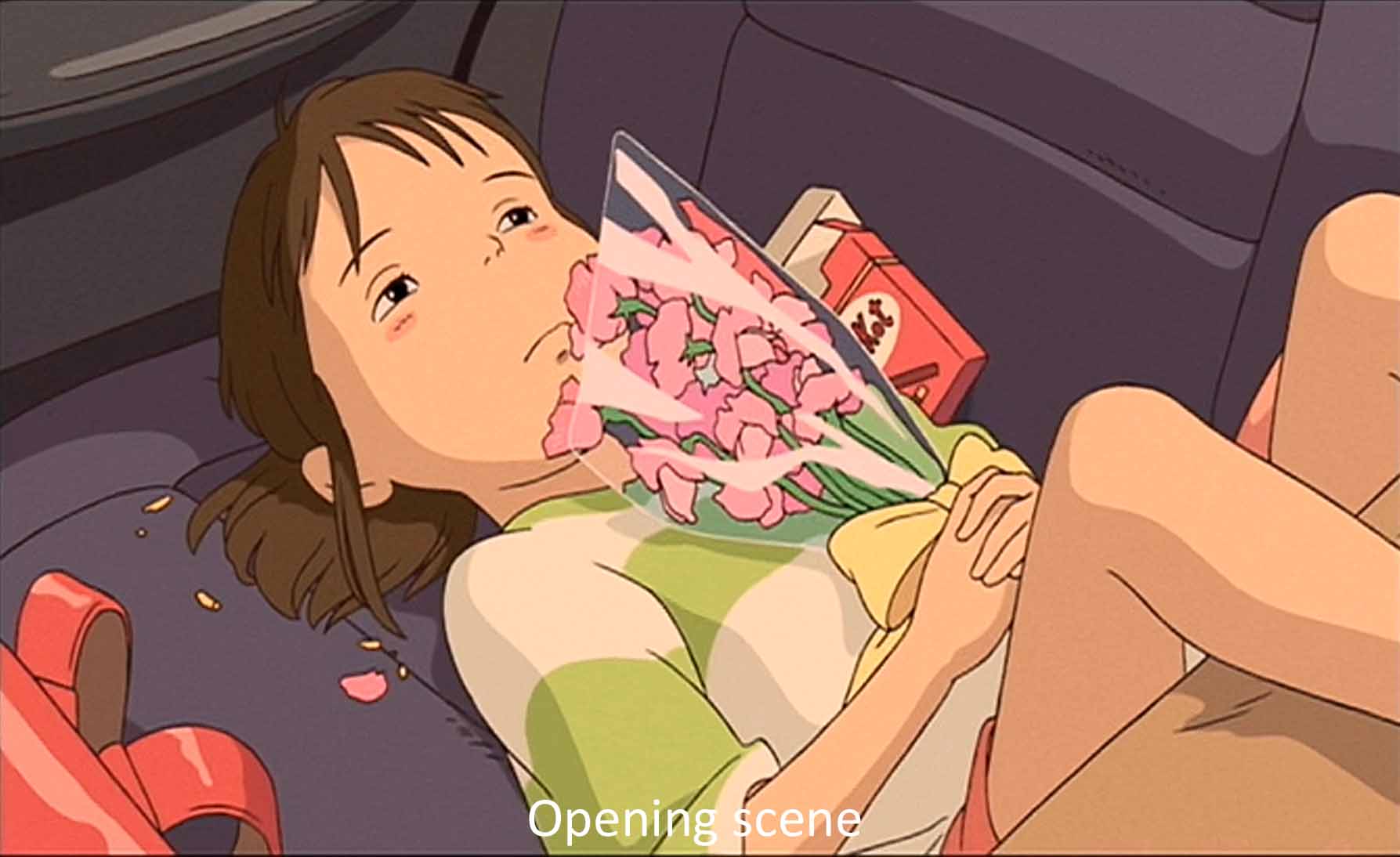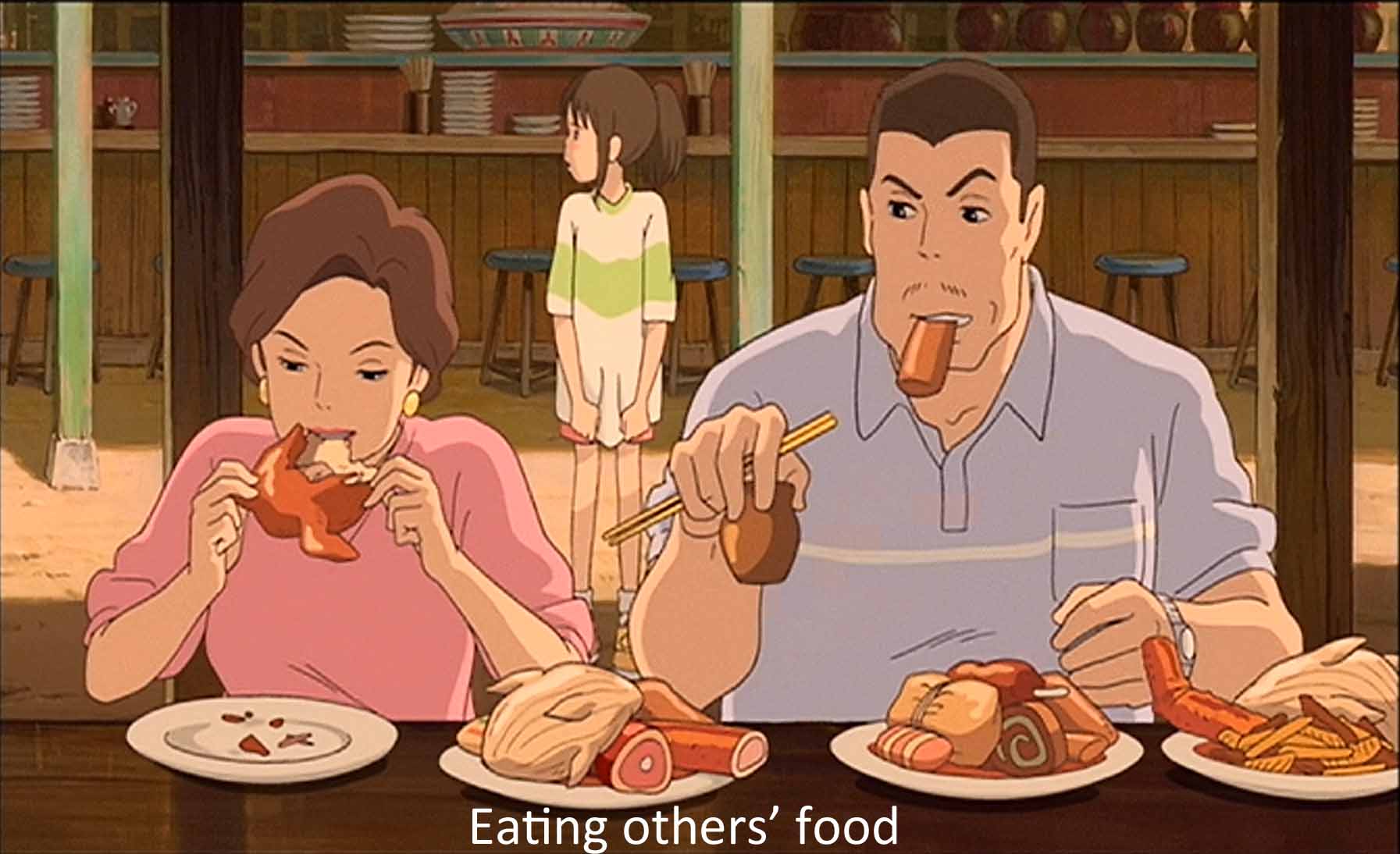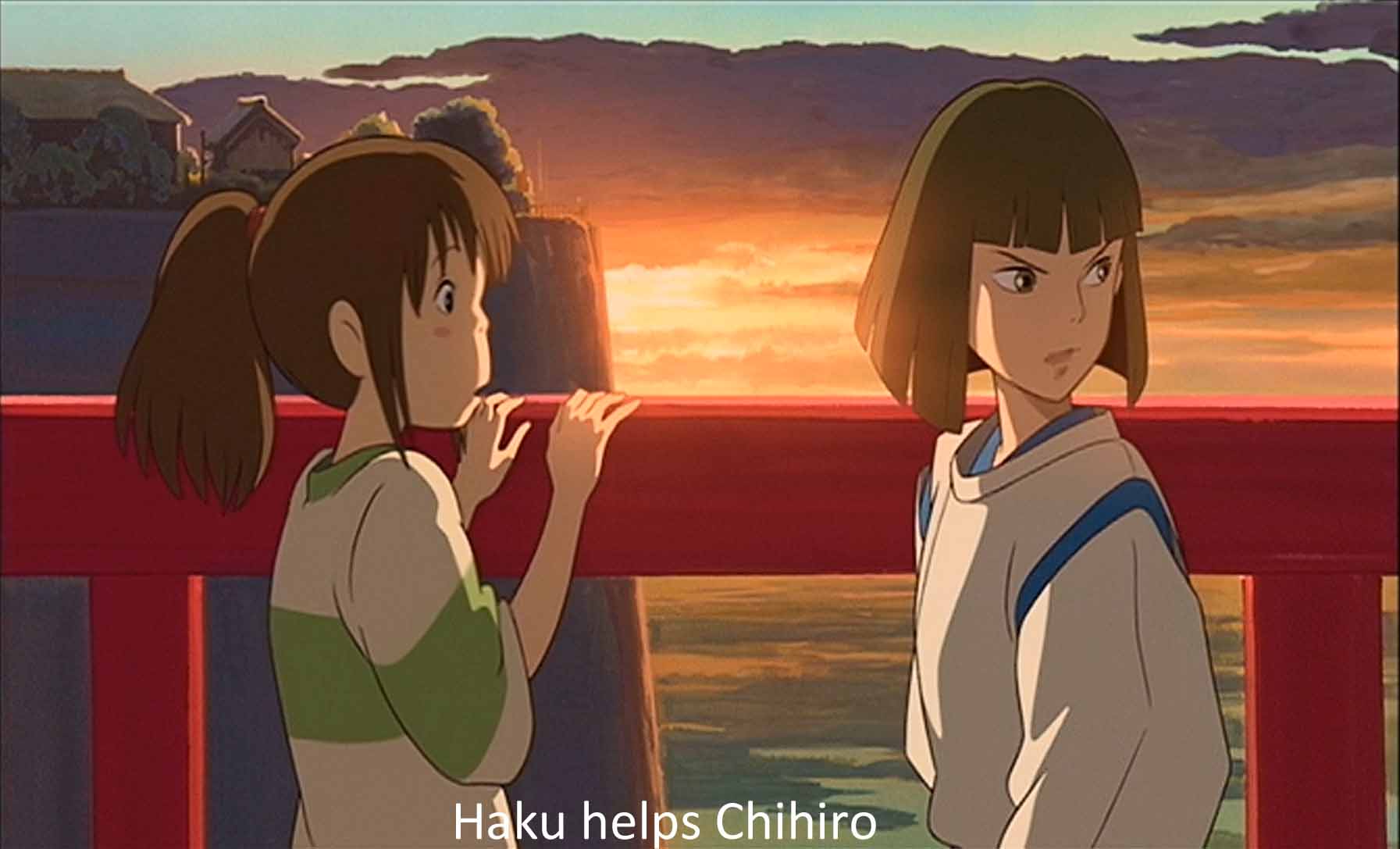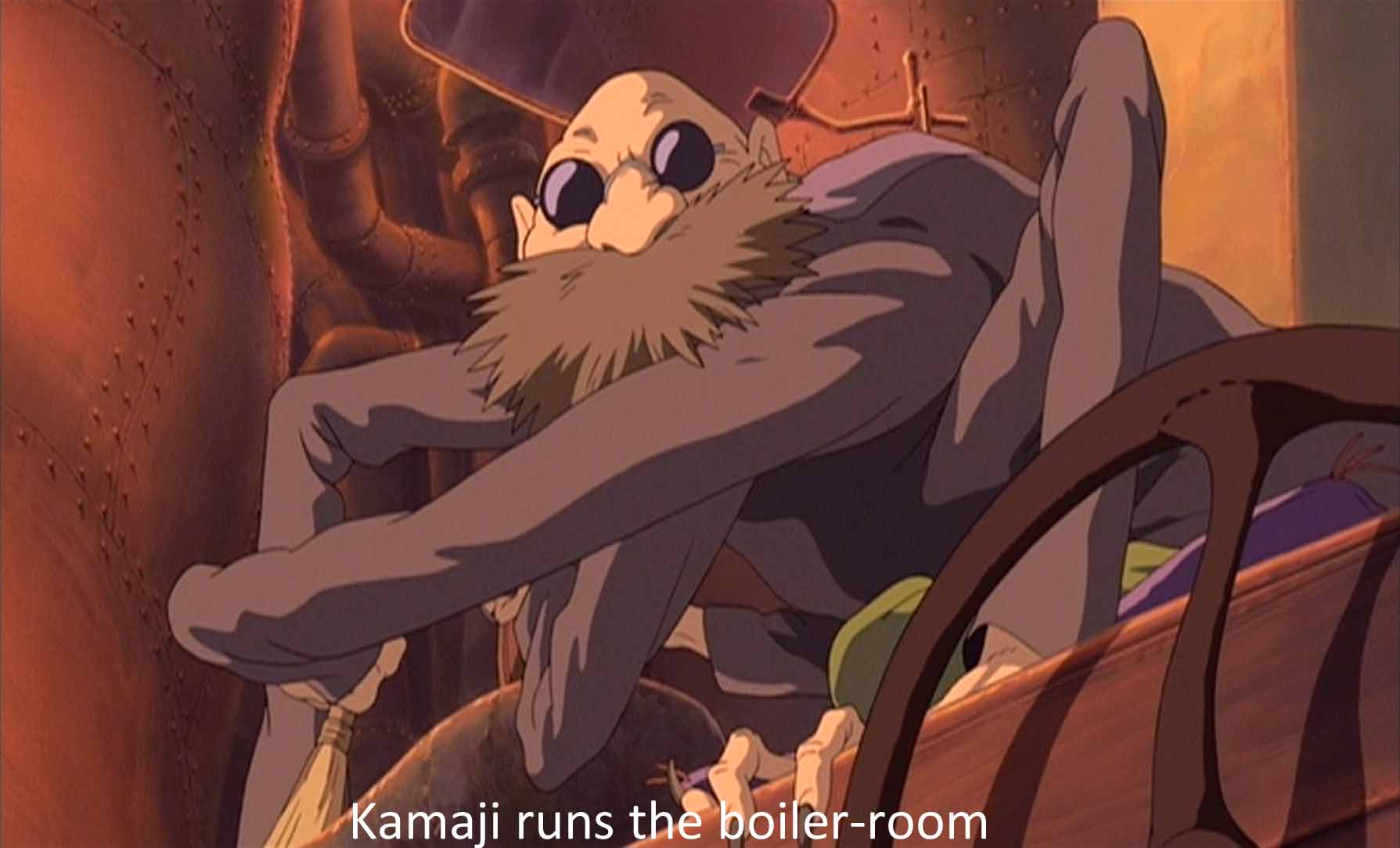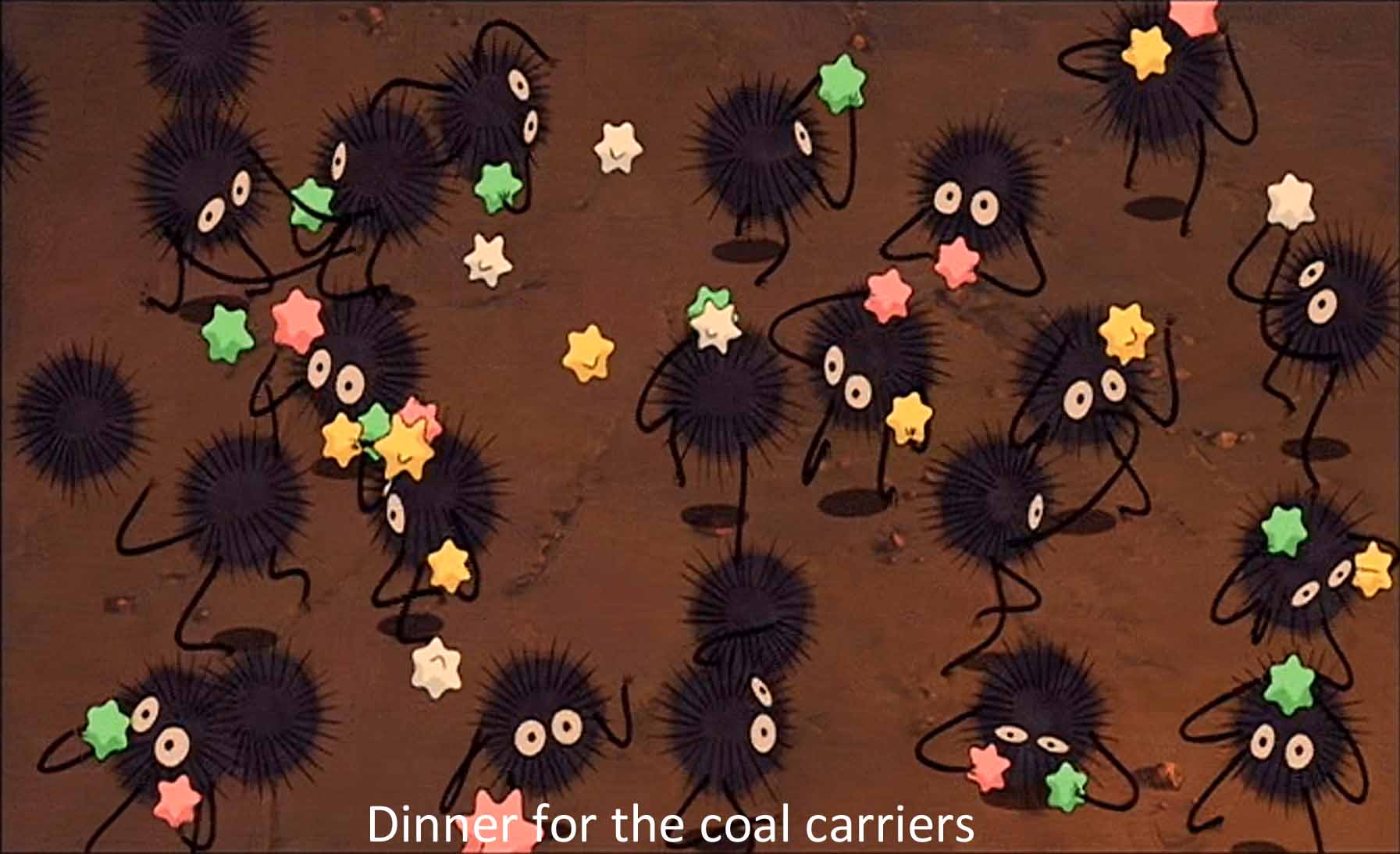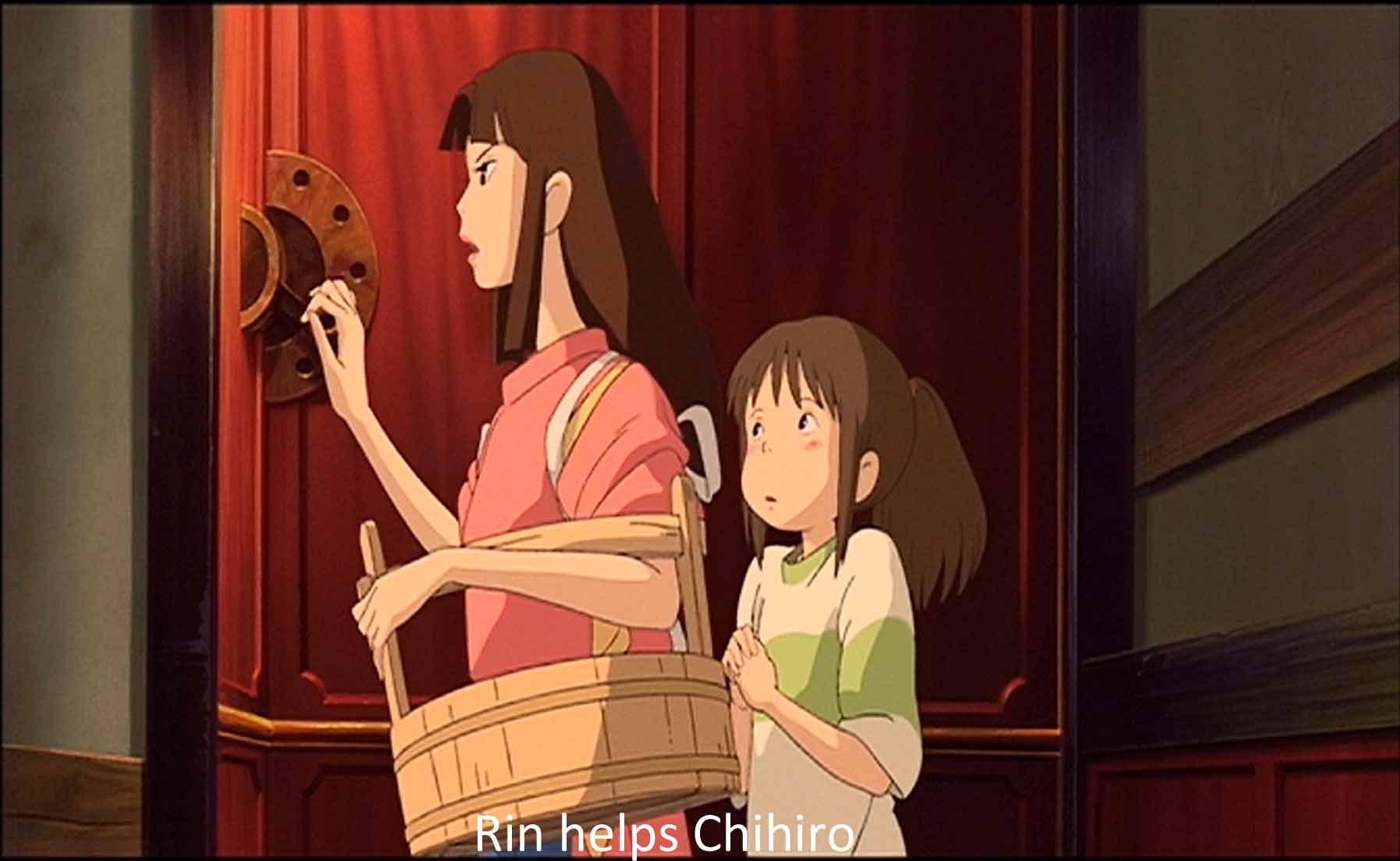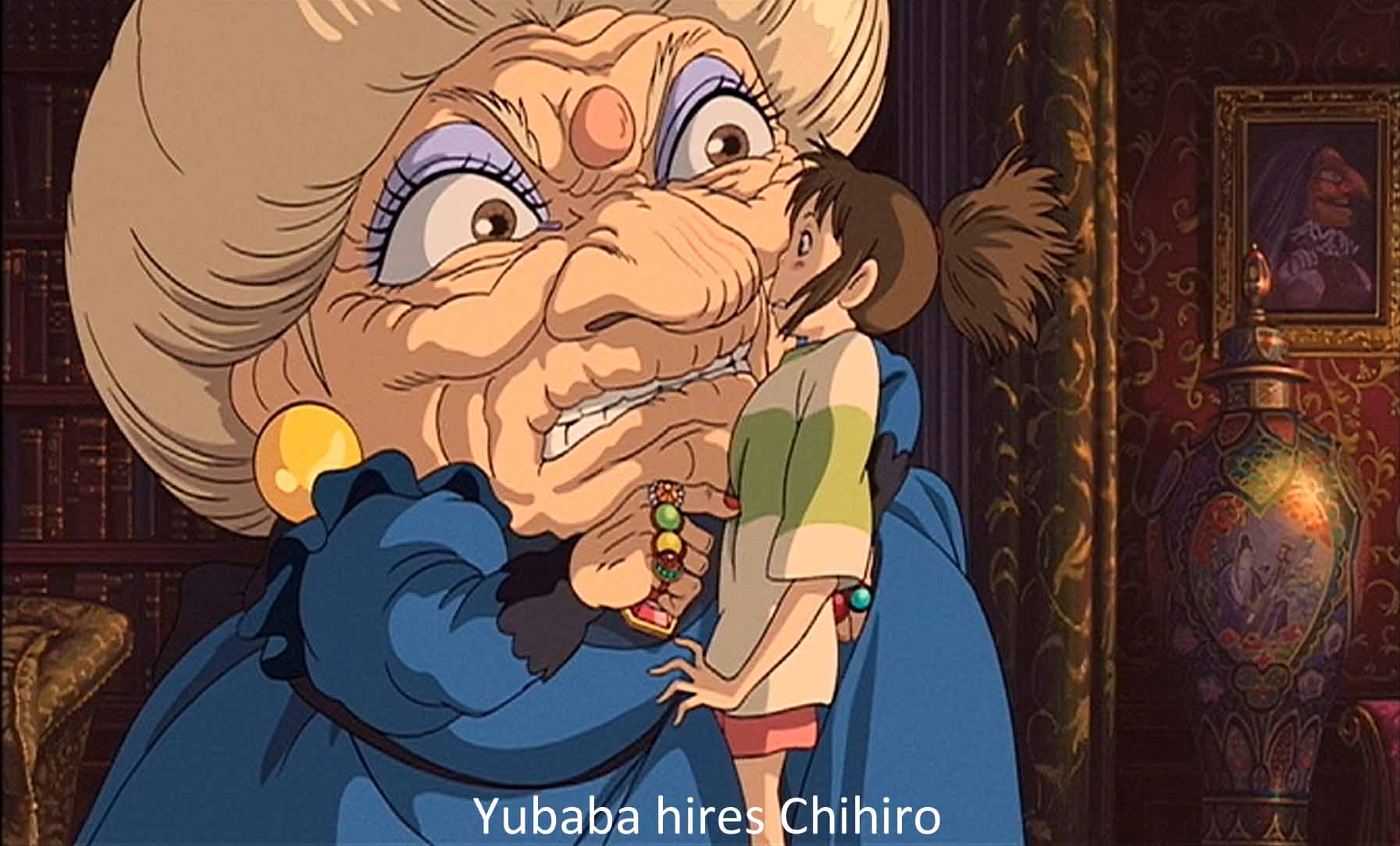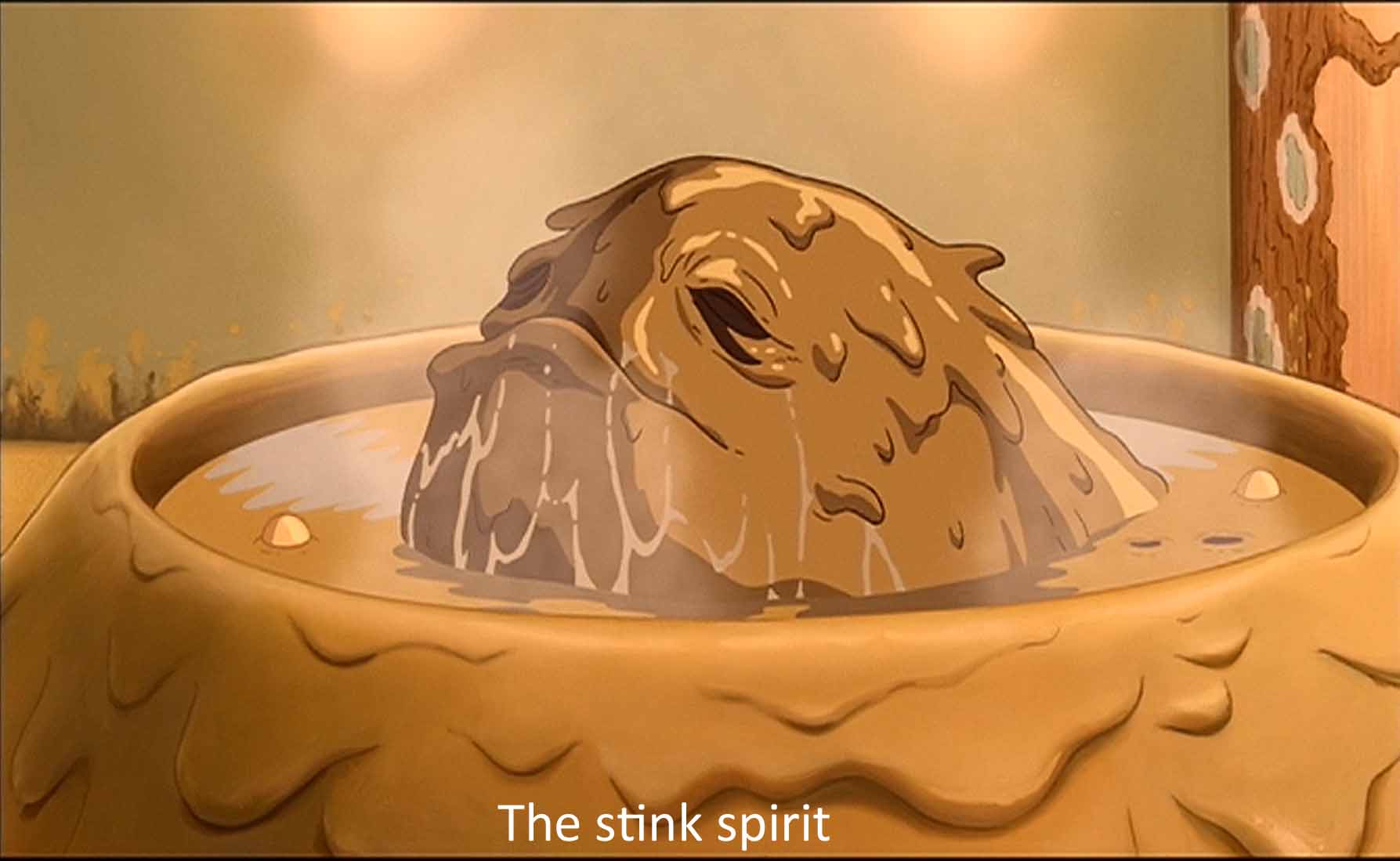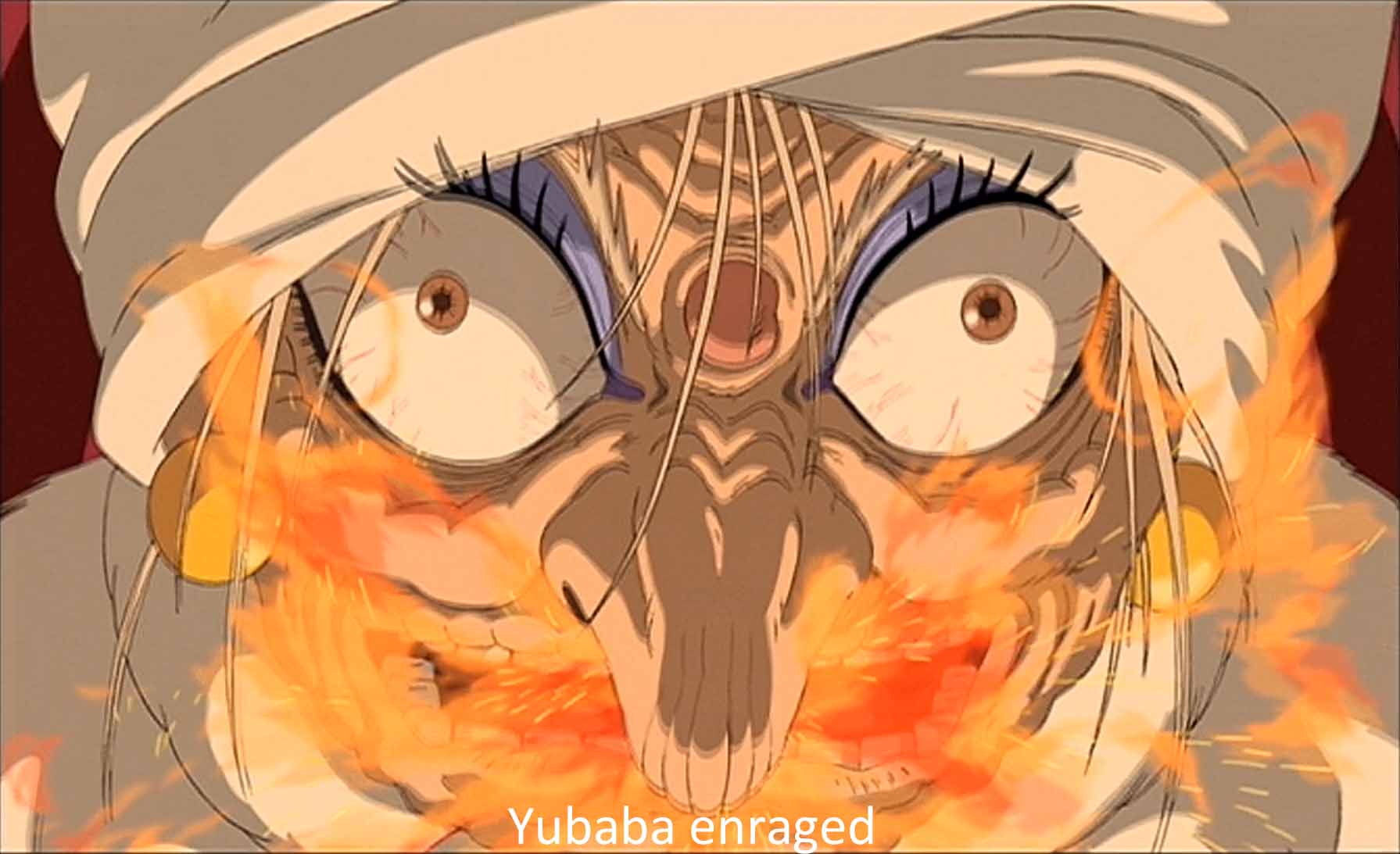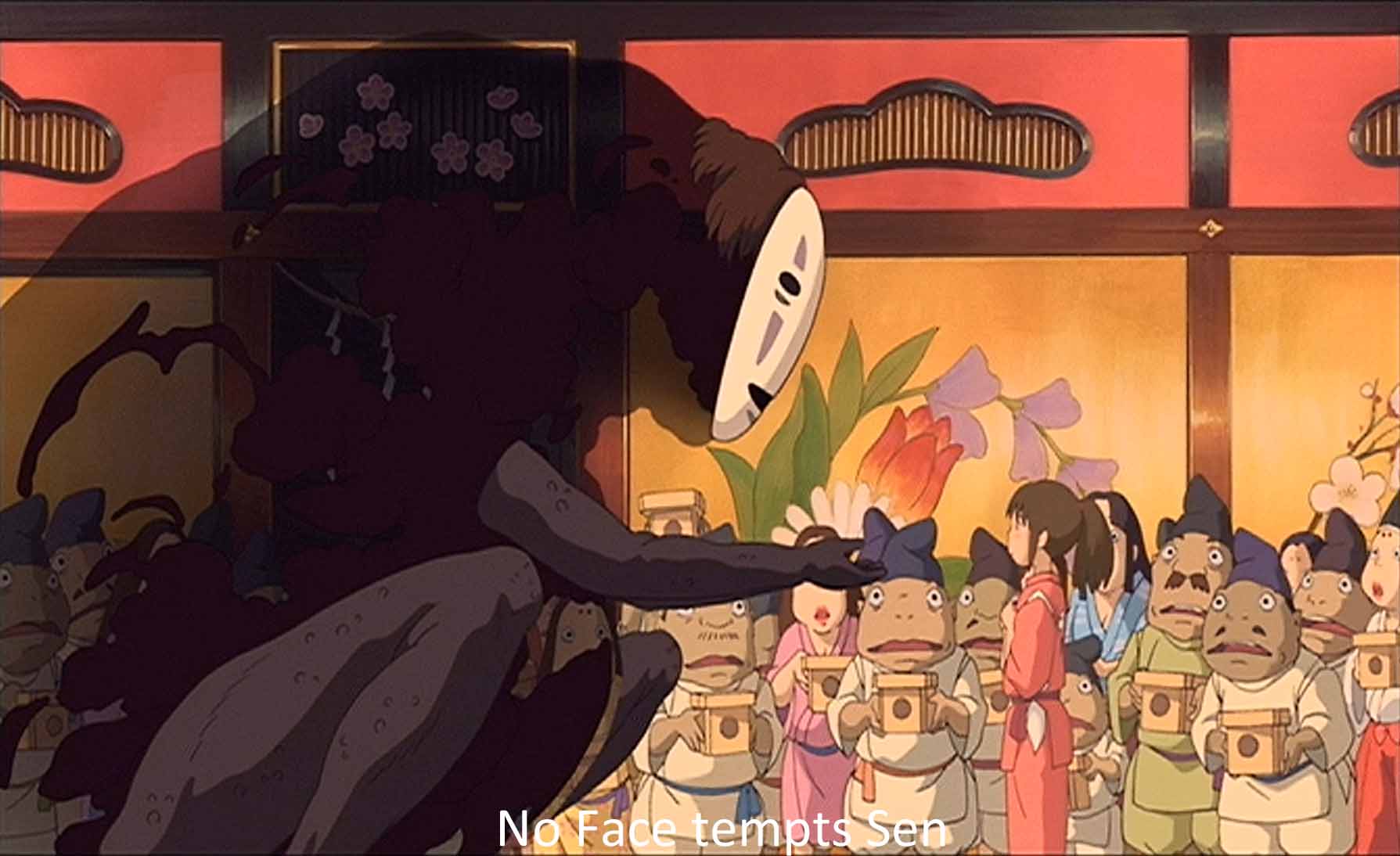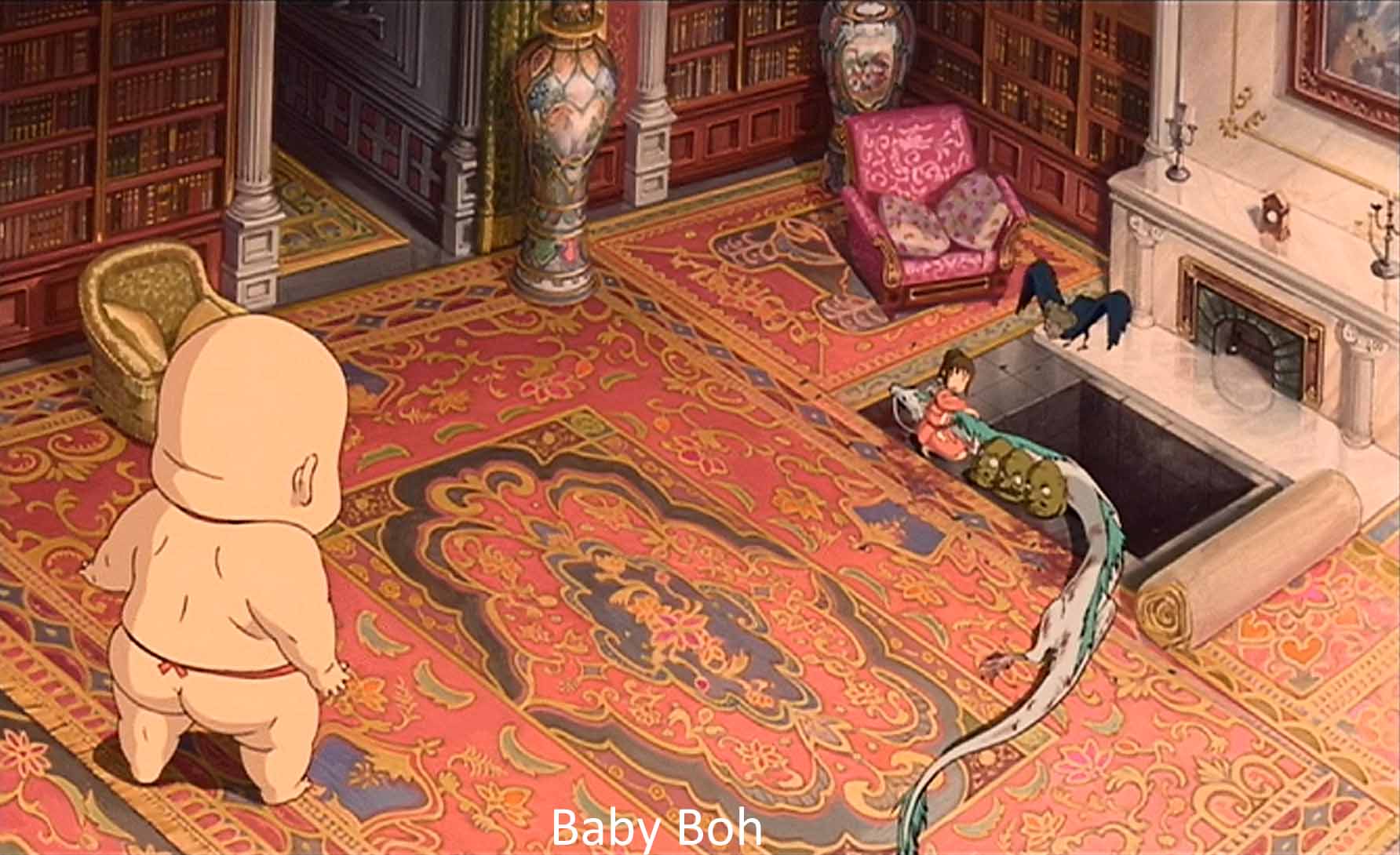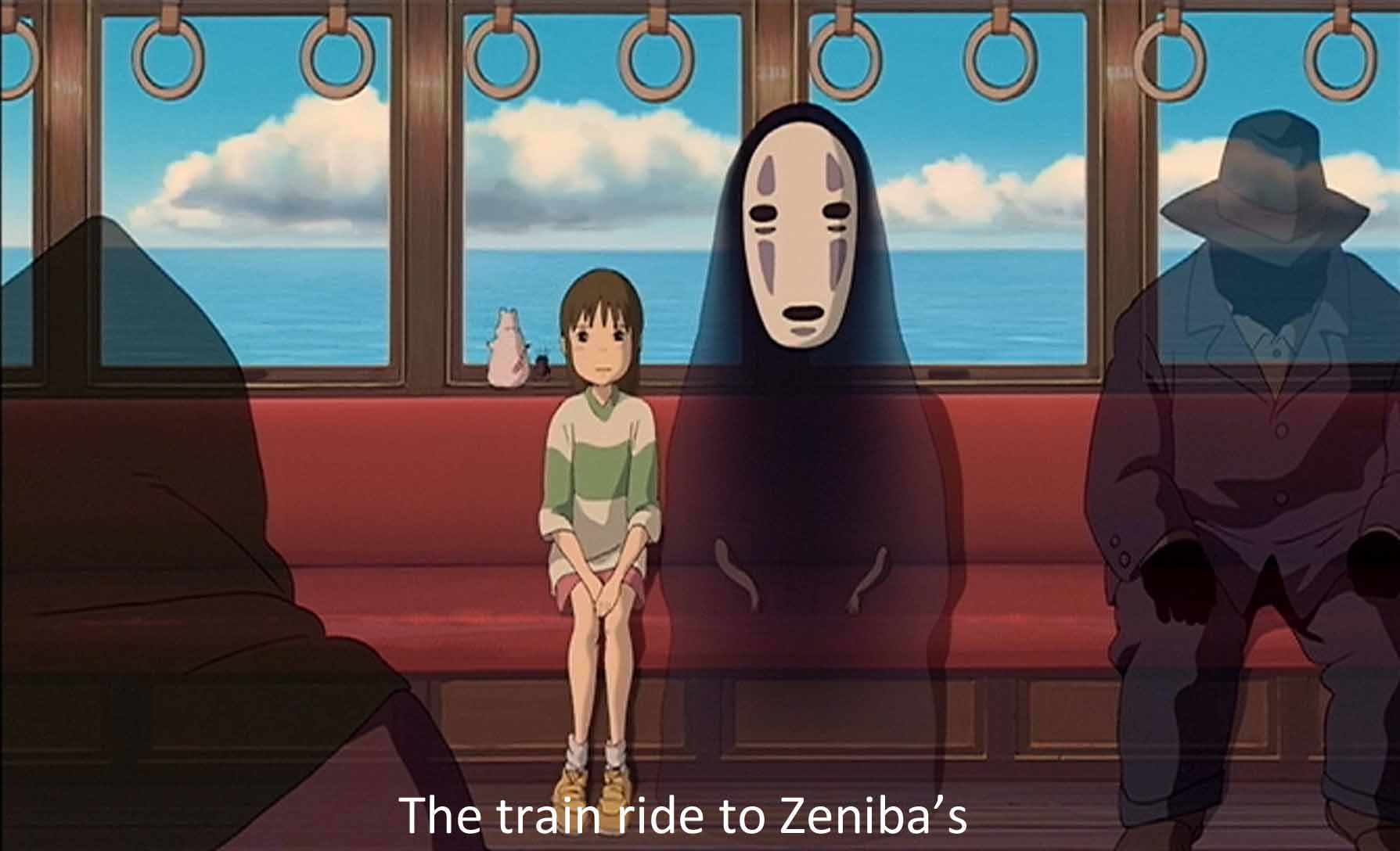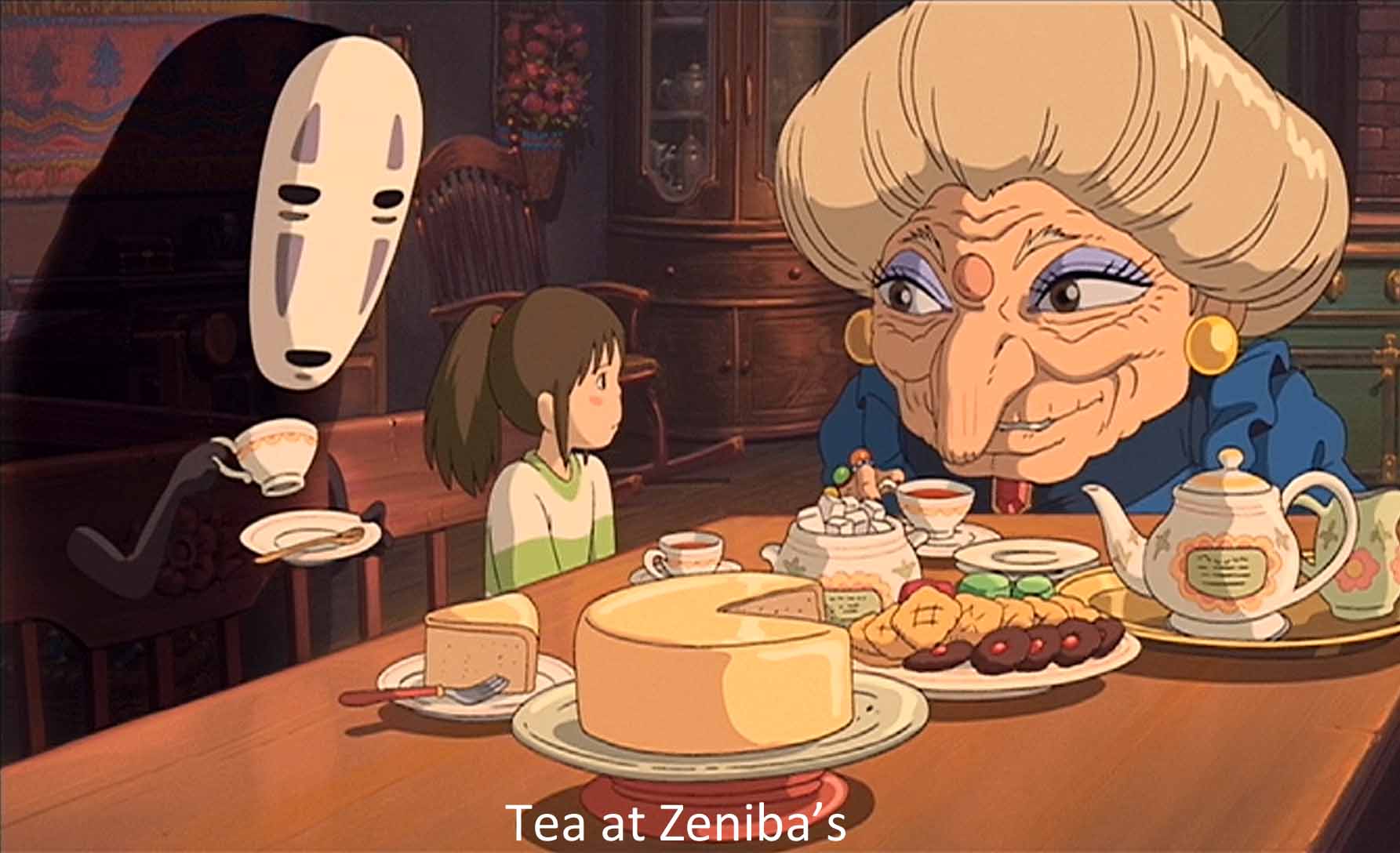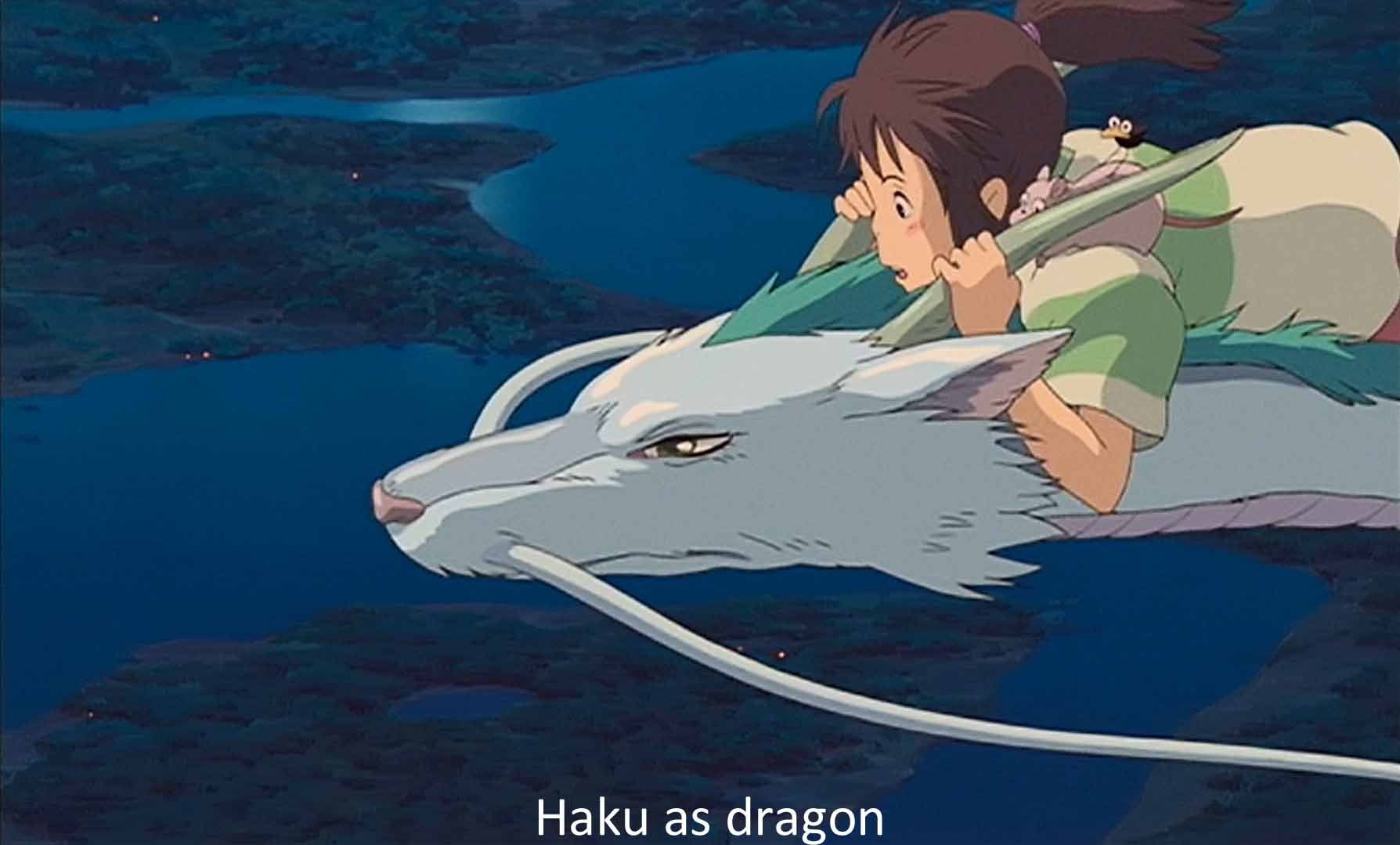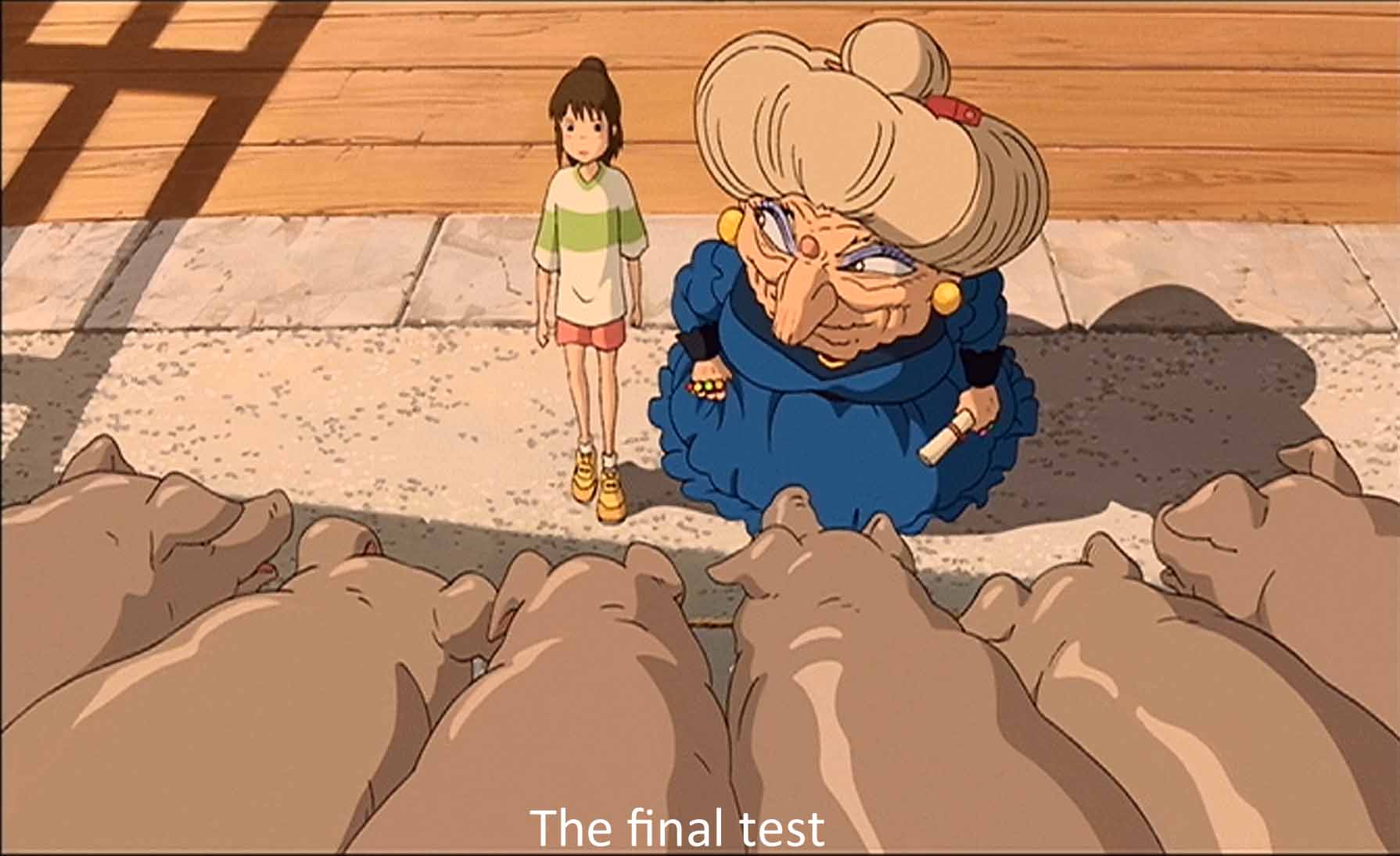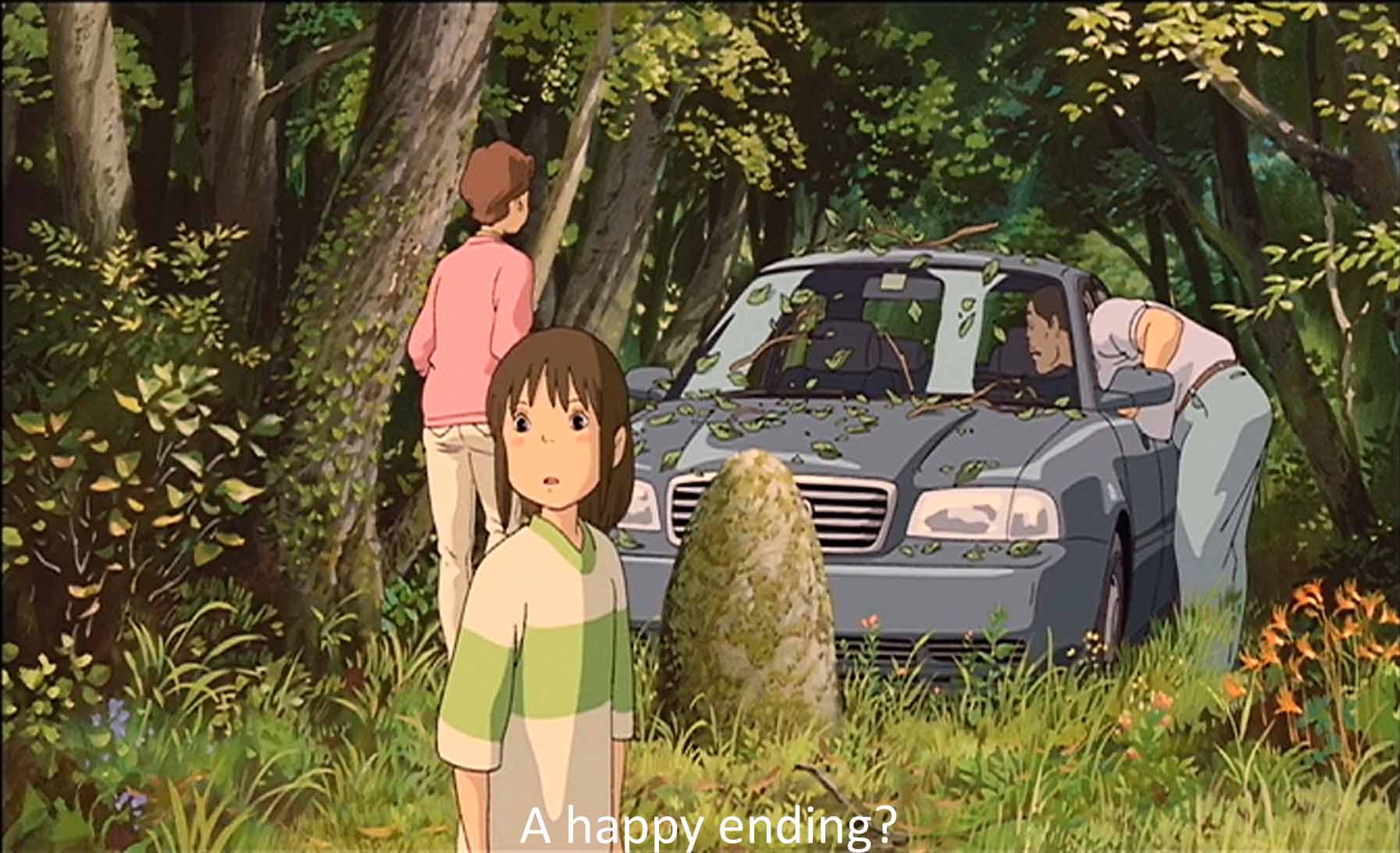Shades of Utopia and Gulliver’s Travels and Brave New World and a long literary tradition. In Spirited Away Miyazaki uses an unreal world to criticize the real one. As he described his hopes to Margaret Talbot, “Money and desire—all that is going to collapse, and wild green grasses are going to take over” (75). Miyazaki gives us a world of surreal and superior beings to create a new view of the world we know, alas, all too well. And these beings are very much in Shinto tradition.
Carmen Blacker writes in her anthropological study of shamanistic practices in modern Japan that, in Shinto, “our human world is no more than a narrow segment of the cosmos . . . beyond it lies a further realm, altogether ‘other,’ peopled by beings non-human, endowed with powers non-human, whose whole order of existence is ambivalent, mysterious, and strange” (2). “Their nature is non-moral, ambivalent, perilous, unpredictable” (24), just the thing for an anime. As a result, someone has said, Japan has eight million gods. We can enter that other world only through special gateways and with difficulty and peril to ourselves. The Japanese title of this film is Sen to Chihiro no Kamikakushi. Kamikakushi means abducted by the gods, quite literally “being spirited away.” And so our heroine is.
The frame story opens with a tetchy, whining ten-year-old girl, Chihiro, (voiced by Daveigh Chase) in the back seat of a car, Mom (Lauren Holly) and Dad (Michael Chiklis) in front. Chihiro looks sadly at a goodbye card and flowers from her best friend. The family is headed to a new home and a new school, neither of which pleases Mom or Chihiro. “This really is the middle of nowhere,” says Mom. Chihiro fusses about having to leave her old school, and Mom complains of the distance to shopping. But Dad reassures. “It’ll be great, once we get used to it.”
To me this is an all-too-familiar scene in America (and presumably in Japan). Dad’s company has decided, for whatever reason, that he must move, and the decision ignores the wishes or well-being of his family. Dad, being an obedient corporate servant, goes along and so, perforce, does the family. Dad likes his situation; he has, he smugly says, cash and credit cards and four-wheel drive.
He uses his four-wheel drive to take a wrong turn, and the family faces an abandoned building made of plaster, not stone. They go through a tunnel and a waiting room for a train station and enter a deserted town that is, oddly, all restaurants. Dad smells food, and he and Mom are soon stuffing themselves from plates of delicacies. Bad idea. They have obviously not read the Odyssey.
Chihiro does not eat but wanders off. She crosses a bridge and finds a wondrous bathhouse. A boy, Haku (voiced by Jason Marsden) warns her to get back across the river before dark. She doesn’t and discovers that her parents have been turned into pigs. She cannot cross the now-flooded plain. She is trapped in the spirit-world—spirited away.
A gorgeous ferry-boat brings crowds of bizarre spirit-gods, who come to this bathhouse to be re-energized. Miyazaki gives us a wonderfully baroque parade of them crossing a bridge to enter. These are the one-percenters of this world, sucked up to and pampered in every way. It was their food that Mom and Dad foolishly ate. Now that the two humans are pigs, they could end up as dinner for these aristocrats.
Chihiro has become transparent (almost a no-person), and Haku gives her something to eat so that she will become human again (one of many echoes of Alice in Wonderland). Above them, a bird with the head of an old woman watches all this.
The bathhouse attendants detect the presence of a human. These spirits and the attendants look down on humans. They smell bad, they’re dirty, they’re incompetent—keep humans out of our bathhouse! They say things that American Southerners used to say of blacks. and that Japanese might still say of Ainu and Koreans.
Haku helps Chihiro, her, telling her to ask for a job from the bathhouse’s boiler-man. She must ask for work or the boss lady will turn her into an animal like her parents. She flounders down a huge flight of stairs to find six-armed Kamaji (David Ogden Stiers) furiously working at the complicated system for distributing scented water to the baths. Chihiro shows she is willing to work by helping some little soot-balls deliver coal. (They are the most charming figures in this film.)
Kamaji accepts her, but tells her she will have to be okayed by Yubaba, the boss. Lin or Rin (Susan Egan), another worker in the boiler room, befriends Chihiro and guides her through fabulous sights to Yubaba (Suzanne Pleshette), the old woman who runs the bathhouse. Yubaba bullies Chihiro until her monstrous, Volkswagen-sized baby, Boh, cries. Tyrannized in her turn by the baby, distracted, she gives Chihiro a job in the boiler room, but she also takes characters from her name to leave her with only Sen for a name. There may be a pun in Japanese, since sen is 1/100 of a yen and rin is 1/1000. The two girls are, in other words, the small change in corporate currency, the least part of this bathhouse enterprise.
Chris Lanier, in a fine article about this film, calls it “one of the best films made about entering the work force.” Sen represents the lowest, last-hired level in the hierarchy of the bath-house. As such she gets the worst food and the worst dormitory. She faces strange rituals that the others know and she doesn’t. The frog foremen give her the worst work (cleaning the dirtiest bath, dealing with the “Stink Spirit”). Later, in a train, she experiences the daily commute by humans reduced to shadows..
Haku takes her to see her parents in the pigpen. They have no memory of being human or parents, and Haku warns Sen that if she forgets her real name, she will never be able to leave the spirit world. Luckily, she finds a card with her name on it (it was the opening shot of the picture). Haku explains that Yubaba controls people by taking their names. “The act of depriving [a person] of one’s name,” Miyazaki has said, “is not just changing how one [person] calls the other. It is a way to rule the other [person] completely.” Later, we see the female workers at the bathhouse pulling their name cards as they check in for their daily labor.
From here on the plot gets complicated. Wikipedia provides a good summary if you wish to see one. I’ll just point to several items with which Miyazaki develops his ideas (at least as I see them):
The bathhouse stands, as I read it, for a consumerist society. Think of a Club Med—those who pay are indulged in every way. And Club Med takes in money for indulging its customers, as does Yubaba’s bathhouse. Yubaba herself seems to me the tyrannical CEO of this enterprise, who exploits and brutalizes her workers. The bathhouse seems to evoke greed when you enter it, either self-indulgence by the spirits or monetary greed by the workers and Yubaba. As Sen says of a character who is trying to devour everything in sight, “He’s only bad in the bath house. He needs to get out of there.” All the spirits do. But they like it there.
Yubaba is an archetype, the all-powerful, all-observing dictatorial boss clutching her profits and luxuries. Her spoiled child Boh is pure consumerism. Through him, Yubaba demonstrates the opposite side of unrelenting capitalism, indulgence of the children of the rich while turning the working poor into wage slaves. Eventually, when shrunk to the size of a mouse, the giant baby is put to work turning a spinning wheel—simple, honest industry—and he seems happy at it.
No Face. A black cloak with a mask on top, tiny arms and legs protruding underneath, and a huge mouth beneath the mask, No Face is a forbidding figure. Sen admits this mysterious spirit, thinking it is another customer. He (it is referred to as “he”) tempts one of the workers with gold, then swallows him, then does the same with two other workers, then tempts everyone, including Yubaba, with gold. They respond by giving him vast amounts of luscious food, and he responds by devouring it, getting bigger and bigger, and finally shouting, “I want to eat everything.”
With Sen, however, he is strangely meek, first awed by her simplicity (she just wants to go help Haku), then frustrated by her refusing his gold. Finally, he turns on her as well. Quieted down, he joins her on the train ride to Zeniba’s house (an especially beautiful sequence in this especially beautiful film).
He is one of the most fascinating figures in a film with many fascinating figures. I read him as a symbol of The Corporation. A corporation is a “juridical person,” persona ficta, a concept established by the Vatican in the 13th century. As a legal fiction, he has no face, nor any identity. (”As a bumper sticker has it, I’ll believe corporations are persons when Texas executes one.”) A corporation serves only to take in money or labor and generate profits. No Face tempts the workers in the bathhouse with gold, and they get greedier and greedier until he starts eating them. Corporations tempt us with wages or riches and then take us over.
No Face is drawn to Sen and humble before her, because she is a human being, a real person with an identity, something he as a legal fiction does not have. He tells Sen he has neither home nor friends nor family. “What is it that you want?,” Sen asks. And he answers, “I want Sen.” And she refuses his offer of much gold—she is not greedy like the rest of the spirits. He wants the one person who resists his temptations. He cries out, “I want to eat everything,” and that seems to be coming true as more and more of the world’s goods and behaviors become enmeshed in corporate greed. He keeps getting bigger and bigger. “I think being in the bathhouse makes him crazy,” says Sen, and that is true of everyone who lives or works in the consumerist society of the bathhouse. Greed creates greed.
The Stink Spirit. This revolting character represents Miyazaki the ecologist’s anger at pollution. The Stink Spirit turns out to be a polluted river. Among the pollutions, of course, would be human and animal excrement, hence the stink and the appearance of the character. In gratitude for his cleansing, the Stink Spirit gives Sen an emetic dumpling that she finds handy at various points in the plot when characters need to be cleaned out. Miyazaki in an interview describes working with friends to clean up a river and finding a bicycle in the muck—and a bicycle is the first thing Sen and Rin and the other bathhouse workers manage to haul out of the muck that is the Stink Spirit.
Haku’s dragon aspect. Haku can turn into a flying dragon (enabling Miyazaki to create the scenes of flight that he loves). Some of Yubaba’s familiar spirits (paper shikigami) attack and wound him. But Sen bravely clambers up broken pipes to help him. Here again one of Miyazaki’s recurring themes: everyone has more than one aspect. Haku can be a helpful boy, or he can be a fierce dragon. But even in this mode he is helpful. He makes sure that Sen, too, is freed. Sen recalls his name for him, and he is freed from Yubaba’s spells. Like the Stink Spirit, he turns out to be a river god.
Zeniba. She looks exactly like Yubaba, and she has magical powers like her twin, but she maintains a simple household without Yubaba’s luxuries and wealth. She is kind to Sen and No Face and the Boh mouse and the teeny blackbird that she made out of Yubaba’s bird of prey. She has a spinning wheel that these latter three characters run, and when No Face proves a good spinner, she offers him a place in her modest household. The corporation is returned to its original purpose: useful work. If Yubaba is the bad mother, Zeniba is the good mother. Here, as so often with Miyazaki, characters, even evil characters have a dual aspect. There is some good in everybody, he seems to say. Nobody is pure evil, not even No Face or Yubaba.
I found it hard to write about this anime, because it develops so many ideas. For one thing, this is a coming of age story. Chihiro at the end has stopped being a whining ten-year-old. Reminded by Dad that she faces a new home and a new school, she calmly says, “I can handle it.” And I don’t doubt that she can. She has gone through an ordeal, a testing, like an Arthurian knight (another theme). Like Arthurian knights she and Haku and other characters (No Face, Yubaba/Zeniba) are trying to find a stable identity—a name. Psychologically, Miyazaki also contrasts two kinds of motherhood, Zineba’s, calm and gracious, praising love, and Yubaba’s, lurching between tyranny (toward her workers) and indulgence (for the monstrous baby). In the social theme, Miyazaki mounts a strenuous attack on a consumerist society built on people’s greed and the corporations’ wage-slavery that supports it.
Most important, though, is greed. This film plays a concerto on greed and how greed creates greed, as we see with Yubaba and her minions, with Chihiro’s parents, and, most fearfully, with No Face. Against greed, Miyazaki poises its opposite: unselfish, altruistic helpfulness as with Haku and Rin and Zeniba and, hooray for her!, Chihiro/Sen.
This social criticism comes in the guise of a movie for little girls. As Miyazaki’s epigraph for this movie says, “For the people who used to be ten years old, and the people who are going to be ten years old” (Cavallero 134-5). Even as one of the former, I can relax and enjoy Miyazaki’s extraordinary visual art. There is the sheer beauty of scenes like the train ride to Zeniba’s house or the bathhouse itself or the ferry-boat or Yubaba’s apartment. Above all there is the utter exuberance of Miyazaki’s imagination: the little gate light at Zeniba’s house, the parade of spirits across the bridge, the flower garden, six-armed Kamaji, and on and on. What a treat! What a masterpiece!
